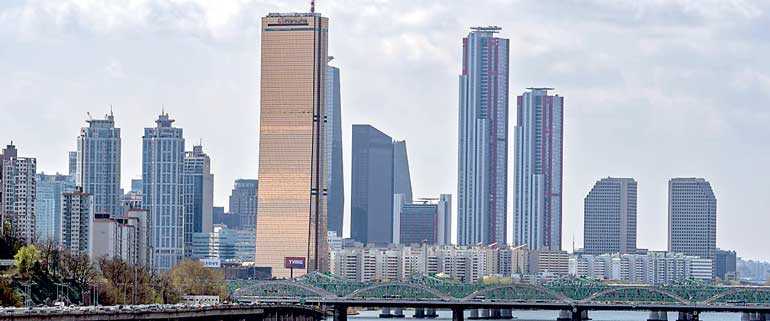Friday Feb 20, 2026
Friday Feb 20, 2026
Tuesday, 2 March 2021 04:02 - - {{hitsCtrl.values.hits}}

A skyline of Seoul's financial district Yeouido
HONG KONG (AFP): Equities rose in Asia on Monday as investors took a breather following last week’s heavy selling, with a drop in US Treasury yields giving markets some much-needed stability, while the passage of Joe Biden’s stimulus through the House provided some cheer.
However, observers warned that trading floors were still gripped by fears the expected global economic recovery will fuel inflation and force a hike in interest rates earlier than previously thought, removing a key pillar of the surge in world markets for the past year.
In a bid to calm markets, several central banks – including in Japan, South Korea and the European Union – sought at the weekend, reiterated their pledges to maintain their ultra-loose monetary policies for as long as needed. Australia’s led the way by ramping up its asset purchases to keep government yields low.
The steep losses last week provided an opportunity for bargain-buyers Monday, sending Asia rallying with Tokyo up more than 2%, while Hong Kong, Shanghai, Sydney, Singapore, Mumbai, Manila and Jakarta put on more than 1%. Wellington and Bangkok also saw gains. Seoul and Taipei were closed for holidays.
London, Paris and Frankfurt all rose more than 1% at the start of trade.
News that Johnson & Johnson’s one-shot vaccine had been given the green light by US regulators – paving the way for a quicker rollout of inoculations – added to the positive sentiment.
However, fears about a spike in inflation continue to linger, and while the imminent passage of Biden’s vast rescue package is expected to bring crucial relief to the economy and struggling Americans, many traders see it as likely to add to the upward surge in prices.
Analysts said reassurances from the Federal Reserve were not easing those concerns.
“The market is testing the Fed and global central banks as to how serious they are here,” Al Lord, at Lexerd Capital Management, told Bloomberg TV. “There are growth expectations and growing inflation concerns, and that’s playing out in the markets.”